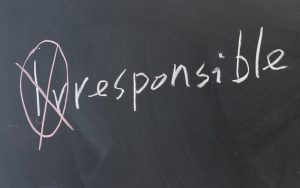Are My Investments Socially Responsible?
 We get this question often, and welcome the discussion. Are my investments contributing to global warming, questionable GMO food practices or gun manufacturing? Will my portfolio help or hurt the next generation? What will I say to my kids/grandkids/friends when they ask me if I invest responsibly? Fortunately, there is a way to know how you are doing, and the responsible choices you have.
We get this question often, and welcome the discussion. Are my investments contributing to global warming, questionable GMO food practices or gun manufacturing? Will my portfolio help or hurt the next generation? What will I say to my kids/grandkids/friends when they ask me if I invest responsibly? Fortunately, there is a way to know how you are doing, and the responsible choices you have.The “good” and the “bad”
What makes a bad company bad? It depends who you ask. TIAA, the not-for-profit Teachers Insurance and Annuity Association, invests over $800 billion in retirement assets for those in the academic, medical and cultural fields. TIAA probably has the longest running social choice investing program, which it defines as “considering environmental, social and governance (ESG) factors” in investment decisions. That sounds good, but it’s a little broad and vague. Do the program’s investment standards match your values and priorities? Let’s look closer at a real client example for guidance.
Jim and Kristine want to go carbon-free
Jim and Kristine (real clients, changed names) feel strongly that they don’t want any of their actions or investments to contribute to global warming, which they believe is aggravated by fossil fuel burning. Their new grandchild has got them thinking carefully about how their actions will leave the world for her future. We did a deep data analysis of their $4m globally diversified index ETF portfolio to see exactly what their carbon footprint was. The answer may surprise you.
 Blame-free, shame-free and non-judgmental
Blame-free, shame-free and non-judgmental
To get an answer for Jim and Kristine, it was most important that we conduct the study independently, without judging their intentions or the outcome. If carbon-free is important to them, then it is important to us. We started with the definition of carbon-free and adopted our local hero State Street’s guidance from SPYX (S&P 500 Fossil Fuel Free) which defines carbon-free as excluding “companies owning fossil fuel reserves.” That’s specific.
Next, we searched all of Jim and Kristine’s underlying stock, bond and alternative investments in their index ETFs looking for companies owning fossil fuel reserves. We didn’t find much. So we took a second approach, reasoning that profits from fossil fuel production are as much as 10% of earnings worldwide. Where would that take us? Again, surprisingly we didn’t find much for reasons too detailed right now for this article. But both methods passed the “common sense check” we use in all Osbon portfolios, so we were ready for the next discussion with Jim and Kristine.
Treading lightly on the world
It turns out that Jim and Kristine are not leaving much of a carbon footprint in the world through their investments. No matter how much we stretched it, we found only about two percent, or $80k of their investment portfolio had a direct link to fossil fuel ownership. Still, $80k is a lot of money. What could they do?
A choice
The knee-jerk choice — “sell all my carbon exposure” — turns out not to be such a great idea, mainly because of unintended consequences. “Bad” companies like Exxon Mobil are now also the largest investors in developing carbon-free energy sources such as solar and wind.
Also, “not owning” is not the same as not endorsing or not supporting. Bluntly speaking, boycotting products has a far more direct effect on companies than selling your stock. If you want to take a meaningful stand, you are better off doing it with your spending, not your portfolio. The two are often confused in the heat of debate.
Better Choices
There are two other choices Jim and Kristine are actively considering now, based on our analysis. One is offset and the other is neutralize. You’ll have to call us if you want to know the details of how they actually work. Both choices are direct, tangible and link their desire directly with their hard-earned lifelong investment dollars.
We admire Jim and Kristine for their thoughtful approach to what they want their money to do, and what money means to them. They want to know what’s possible, what’s sensible and figure it out over time, learning in the process. Let us know if you would like to engage us to look at your portfolio, and find out for you how socially responsible your investments are.
Max Osbon – mosbon@osboncapital.com
Weekly Articles by Osbon Capital Management:
"*" indicates required fields
